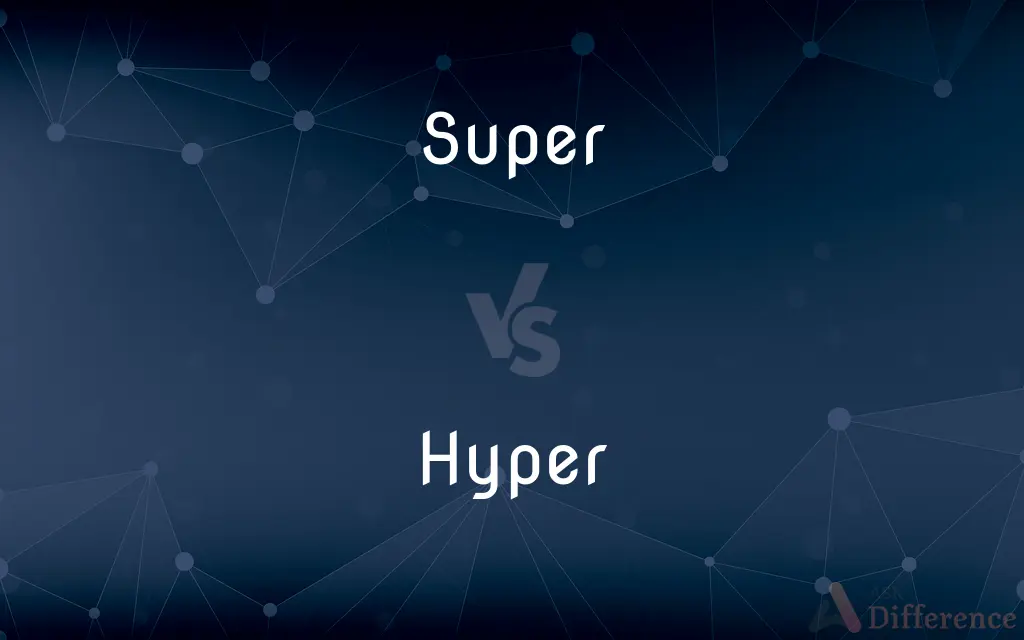Super vs. Hyper — What's the Difference?
By Maham Liaqat & Fiza Rafique — Updated on March 24, 2024
Super signifies excellence or superiority, often indicating something above average or normal, while hyper denotes excess, extreme activity, or an intensified state beyond the usual.

Difference Between Super and Hyper
Table of Contents
ADVERTISEMENT
Key Differences
Super is used to describe an enhanced quality or level, suggesting something is above standard or expectations in a positive way. It's often prefixed to adjectives and nouns to denote superiority or higher rank, such as in "superhero" or "superpower," where the emphasis is on exceptional abilities or qualities. Conversely, hyper focuses on extremeness or excessiveness, frequently associated with heightened activity or energy levels beyond what is considered normal. It's seen in terms like "hyperactive" or "hyperspeed," indicating a degree of intensity or activity that surpasses usual limits.
While super often carries a positive connotation, suggesting enhancement or superiority, hyper suggests an overwhelming or excessive state that might not always be positive. For example, "super strength" is generally seen as a beneficial attribute, whereas "hyperactivity" can imply a problematic excess of energy. This distinction highlights the nuanced difference in how the two prefixes frame the qualities or states they describe.
In terms of application, super is versatile, applying to a broad range of contexts from everyday language ("supermarket," indicating a large and comprehensive store) to technical and scientific terminology. Hyper, while also versatile, tends to appear in more specialized contexts, especially in science and technology, to describe phenomena or conditions at extreme or excessive levels, such as "hypertension" in medicine or "hypertext" in computing.
The distinction between super and hyper also extends to their linguistic roots and implications. "Super-" comes from Latin, meaning above, beyond, or in addition to, and it retains this sense of adding quality or value. "Hyper-" is derived from Greek, meaning over, beyond, or excessively, and it often implies a quantitative or qualitative excess. These origins reflect in their current usage, where super adds a layer of excellence or superiority, and hyper adds a sense of excess or intensification.
Despite their differences, both prefixes serve to amplify or extend the meanings of the words they modify. However, the nature of the amplification differs, with super enhancing or elevating, and hyper intensifying or exaggerating, reflecting their respective linguistic and conceptual nuances.
ADVERTISEMENT
Comparison Chart
Meaning
Above average, excellent, or enhanced quality.
Excessive, extreme, or intensified state.
Connotation
Generally positive, indicating superiority.
Can be neutral or negative, indicating excess.
Common Usage
Describes enhanced qualities or abilities.
Describes extreme conditions or activities.
Examples
Superhuman, supermarket, superpower.
Hyperactive, hypertension, hypersonic.
Linguistic Origin
Latin "super-" meaning above or beyond.
Greek "hyper-" meaning over or excessively.
Compare with Definitions
Super
Enhanced level.
The car has super speed capabilities.
Hyper
Extreme degree.
The plane reached hypersonic speeds.
Super
Above standard.
He is a superhero in his community.
Hyper
Beyond usual limits.
He has hypertension due to stress.
Super
Excelling in a particular quality.
She felt super happy today.
Hyper
Intensely focused.
She's hyper-focused on her research.
Super
Superior quality.
She has super strength.
Hyper
Overly abundant.
The debate was hypercharged with emotion.
Super
Beyond normal.
It's a supermarket with more than just groceries.
Hyper
Excessive energy.
The child was hyperactive during class.
Super
An article or a product of superior size, quality, or grade.
Hyper
Hyperactive or unusually energetic
Eating sugar makes you hyper
Super
A superintendent in an apartment or office building.
Hyper
Having a very excitable or nervous temperament; high-strung.
Super
A supernumerary.
Hyper
Emotionally stimulated or overexcited.
Super
Very large, great, or extreme
"yet another super Skyscraper" (Dylan Thomas).
Hyper
(colloquial) hyperactive
Super
Excellent; first-rate
A super party.
Hyper
(slang) energetic; overly diligent
Super
Especially; extremely
A super accurate missile.
Was super careful.
Hyper
Hyperspace
Super
Of excellent quality, superfine.
Hyper
Hyperextension exercise
Super
Better than average, better than usual; wonderful.
Super
(informal) Very; extremely (used like the prefix super-).
The party was super awesome.
Super
(beekeeping) superhive
Super
, especially, a building's resident manager sometimes clarified as “building super”.
Super
(neologism) nodot=1, especially as distinguished from bright.
Super
; (theatre) specifically, a supernumerary actor.
Super
(beekeeping) superhive
Super
(television) superimpose
Super
A contraction of Supernumerary, in sense 2.
Super
A caretaker for an apartment house; represents the owner as janitor and rent collector
Super
Of the highest quality;
An ace reporter
A crack shot
A first-rate golfer
A super party
Played top-notch tennis
An athlete in tiptop condition
She is absolutely tops
Super
Including more than a specified category;
A super experiment
Super
Extremely large;
Another super skyscraper
Super
To an extreme degree;
The house was super clean for Mother's visit
Common Curiosities
Can "super" and "hyper" be used interchangeably?
Not typically, as they have different nuances; super suggests superiority, while hyper suggests excess.
What does "super" imply in everyday language?
Super implies an enhanced quality or superiority, indicating something is better or above average.
Can "hyper" be positive in any context?
Yes, in contexts where extreme levels of activity or energy are beneficial or admired, such as "hyper-efficient."
What makes "super" a positive descriptor?
Super often denotes enhancement, improvement, or a higher degree of quality, which are generally viewed positively.
How do "super" and "hyper" affect the meaning of words they prefix?
Super elevates or enhances the base word, whereas hyper intensifies it, often suggesting an excess.
How is "hyper" commonly used?
Hyper is used to describe an extreme or excessive state, often relating to energy, speed, or intensity.
Is "hyper" always negative?
Not always, but it can imply problematic excessiveness, depending on the context.
What role does "super" play in popular culture?
It's often used to describe heroes or abilities that are beyond ordinary, appealing to ideals of excellence and heroism.
Why might someone use "hyper" to describe a condition?
To indicate that the condition exceeds normal levels or is characterized by excessive activity or intensity.
How does "hyper" relate to technology and science?
It's used to describe phenomena or technologies that exceed standard capabilities or speeds, like hypertext or hypersonic flight.
What is an example of "super" in a non-positive context?
Rarely, but it could be used in contexts where superiority implies exclusion or elitism, though this is less common.
How do the origins of "super" and "hyper" influence their use?
Their Latin and Greek origins, respectively, guide their application in enhancing or exaggerating qualities in English.
Can "hyper" describe physical conditions?
Yes, it frequently describes physical conditions characterized by excessiveness, such as hypertension.
What is the importance of context in interpreting "super" and "hyper"?
Context determines whether these prefixes imply positive enhancement, excessive intensity, or problematic extremes, highlighting their nuanced applications.
What's the difference between "superpower" and "hyperpower"?
"Superpower" refers to an exceptional ability or a powerful country, while "hyperpower," a less common term, might suggest a country with overwhelming global influence, emphasizing the degree of power or dominance.
Share Your Discovery

Previous Comparison
Square vs. Rhombus
Next Comparison
We vs. UsAuthor Spotlight
Written by
Maham LiaqatCo-written by
Fiza RafiqueFiza Rafique is a skilled content writer at AskDifference.com, where she meticulously refines and enhances written pieces. Drawing from her vast editorial expertise, Fiza ensures clarity, accuracy, and precision in every article. Passionate about language, she continually seeks to elevate the quality of content for readers worldwide.














































